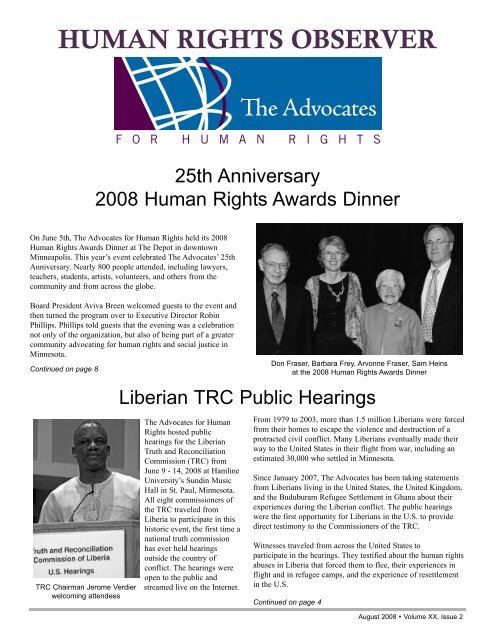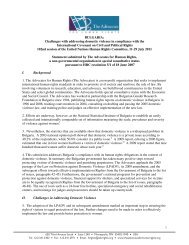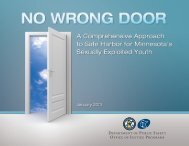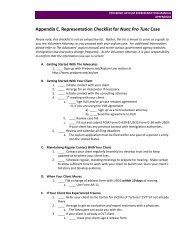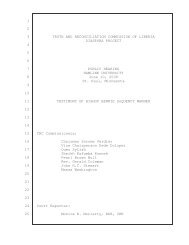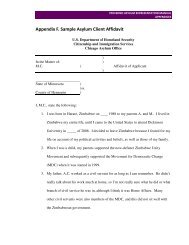HUMAN RIGHTS OBSERVER - The Advocates for Human Rights
HUMAN RIGHTS OBSERVER - The Advocates for Human Rights
HUMAN RIGHTS OBSERVER - The Advocates for Human Rights
Create successful ePaper yourself
Turn your PDF publications into a flip-book with our unique Google optimized e-Paper software.
Observer Page 6Liberian Refugees in Ghana Being RepatriatedAs a part of its Liberian TRC Diaspora Project, <strong>The</strong> <strong>Advocates</strong>has established a connection with the community of Liberianrefugees in the Buduburam settlement outside of Accra, Ghana.<strong>The</strong>re currently are more than 38,000 refugees living inBuduburam. <strong>The</strong> <strong>Advocates</strong> has traveled to the settlement onthree occasions as part of its work with the Liberian TRC.Liberians began arriving in Ghana in 1990 in the wake of theatrocities being committed in their home country. Although theperception from the outside might be that this settlement mustbe well established after 18 years, opportunities <strong>for</strong> employmentand education are scarce. Health and sanitation conditions aresubstandard. A solution <strong>for</strong> those living in the camp has beenelusive – Liberia is not ready to receive them home, they arelargely dependent on remittances and NGO support in Ghana,and resettlement to third countries has been largely stopped.<strong>The</strong>se issues have sparked tensions in the debate overintegration versus repatriation <strong>for</strong> Liberian refugees.At the beginning of 2008, the Ghanaian government announceda multi-million dollar program to integrate Liberian refugeesinto Ghanaian society, as previous repatriation ef<strong>for</strong>ts hadreceived minimal participation. On February 9, a group ofrefugees delivered a petition to the UNHCR and the GhanaRefugee Board. <strong>The</strong> petition stated that they “strongly oppose”integration into Ghanaian society and that they were requestingto be resettled in a third country or to be given US $1,000 inorder to start a new life back in Liberia. In conjunction with thisrequest, hundreds of Liberian refugees – primarily women and<strong>The</strong> <strong>Advocates</strong>’ Cheryl Thomas Invited toU.N. Expert MeetingParticipants at breakout sessionAugust 2008 Volume XX, Issue 2In May 2008, CherylThomas, director of theWomen’s <strong>Human</strong> <strong>Rights</strong>Program, was one offifteen experts invited toa United Nations ExpertGroup Meeting inVienna on best practicesin legislation on violenceagainst women.<strong>The</strong> meeting was convened by the Division <strong>for</strong> the Advancementof Women. Other experts were from Spain, Honduras, Uruguay,Turkey, India, the United Kingdom, Austria, the Netherlands,Philippines, Nigeria, Kenya, Croatia, the Pacific Islands, SouthAfrica, and the United States. <strong>The</strong> meeting involvedplenary sessions with all participants and breakout groups ondomestic violence and sexual assault. Discussions focused onbest practices and lessons learned on legal re<strong>for</strong>m on violenceagainst women.children – held a month-long protest on a soccer field inBuduburam.On March 17th, Ghanaian authorities arrested 630 of theprotesters. <strong>The</strong> detained protesters, virtually all women andchildren, were taken to Kodeabe Youth Camp in the EasternRegion of Ghana. In the process, many families were separated.<strong>The</strong> conditions of this detention area were of grave concern.Reports showed that two pregnant women had miscarriageswhile detained, and others suffered from scorpion bites. Onewoman who had diarrhea was only saved by the intervention ofa human rights activist who called the commander of thesecurity unit <strong>for</strong> her to get medical attention. After interventionfrom UNHCR, the Liberian government, and Ghanaian humanrights NGOs, 90 of the most vulnerable women and childrenwere released after a few days, and ultimately, all of thedetainees were released back to the camp. However, thecrackdown also included arrests of Liberian men from the camp,several of whom were summarily deported, apparently withoutdue process of law in Ghana.After the protests, the Ghanaian government and UNHCR cameto an agreement to close the camp and repatriate the refugeesback to Liberia. <strong>The</strong> unrest highlights the tragic plight ofrefugees who flee situations of long-term conflict. Findingdurable solutions <strong>for</strong> long-term refugee crises must be acontinuing point of advocacy <strong>for</strong> those concerned with humanrights globally.On the first day,all participantspresented theirpapers on variouslegal re<strong>for</strong>mef<strong>for</strong>ts on violenceagainst women.Cheryl Thomaspresented herpaper on the topic,“Legal Re<strong>for</strong>m on Cheryl Thomas with other expertsDomestic Violencein Central and Eastern Europe and the Former Soviet Union.”Participants reported a wide range of activities and progress onef<strong>for</strong>ts to address violence against women. <strong>The</strong>re was agreementamong the group that there is an urgent need internationally <strong>for</strong>standards and best practice models <strong>for</strong> governments and civilsociety groups to use as they embark on legal re<strong>for</strong>m ef<strong>for</strong>ts. Asa follow-up to the meeting, participants are drafting a modelframework <strong>for</strong> legislation on violence against women.
Observer Page 7Protecting Women’s <strong>Rights</strong> OverseasIn June, Cheryl Thomas, Mary C. Ellison, and Aviva Breentraveled to Yerevan, Armenia <strong>for</strong> two days of meetings withapproximately sixteen government and non-governmentalofficials involved in drafting and advocating <strong>for</strong> a new domesticviolence law in the Republic of Armenia. <strong>The</strong> Women’s <strong>Rights</strong>Center and its president, Susanna Vardanyan, invited <strong>The</strong><strong>Advocates</strong> to facilitate the two-day meeting. <strong>The</strong> twoorganizations have collaborated in the past, and in 2000, <strong>The</strong><strong>Advocates</strong> published a human rights report entitled “DomesticViolence in Armenia.”Participants included officials in the Ministries of Health,Justice, Labor, and Social Affairs, the Republic of ArmeniaPolice, and representatives of non-governmental organizations,including the Armenian Helsinki Committee and the Women’s<strong>Rights</strong> Center. A representative from the Organization <strong>for</strong>Security and Cooperation in Europe’s (OSCE) Office ofDemocratic Institutions and <strong>Human</strong> <strong>Rights</strong> and a representativeof the Open Society Institute Foundation also attended themeeting,providing animportantperspective ondevelopments inthe protection ofwomen fromviolence in theFormer SovietUnion andCentral andEastern EuropeMembers of the Armenian working group (FSU/CEE).practices from the U.S., Bulgaria, and Georgia, among othercountries. Participants engaged in a lively discussion of anumber of concepts and points in their draft law, including thedefinition of domestic violence, the types of remedies thatshould be available to victims, and the responsibilities of thegovernment and non-governmental organizations.<strong>The</strong> culmination of the meetings was a practice parliamentaryhearing. During the practice hearing, many of the participantstestified to prepare <strong>for</strong> likely questions and arguments fromelected officials. <strong>The</strong> following is a summary of some of thetestimony:“I would like to thank the honorable members of the parliament<strong>for</strong> agreeing to these hearings and to ask them to be ready <strong>for</strong>further cooperation. Our sisters, our daughters, and our mothersare affected by domestic violence. We have witnessed moredomestic violence than the statistics suggest. In order to ensuresafety and in order <strong>for</strong> us to be a civilized country, we need thisdomestic violence law. This kind of law has already been passedin other democratic countries, and societies are yielding thefruits of these laws.”“<strong>The</strong> essence of the law should be orders to protect the victims.In practice, we face problems because we have a gap in the legalframework when representing victims. We should officiallyrecognize that there is a problem. We cannot pretend that we donot have this responsibility. <strong>The</strong> parliament should takeresponsibility and pass this law. Passing a domestic violence lawis a matter of national security, international human rights, andconstitutional rights. It ensures rights, prosperity, andwell-being.”<strong>The</strong> goals <strong>for</strong> the two days of meetings were to expandparticipants’ knowledge of international best practices ondomestic violence legal re<strong>for</strong>m, and to give participantstechniques and strategies to convince members of parliament toadopt the new domestic violence law. <strong>The</strong> <strong>Advocates</strong> shared best<strong>The</strong> working group will continue its work to advocate <strong>for</strong> thenew law by consulting with counterparts in other FSU/CEEcountries, as well as international experts. <strong>The</strong> Armenia groupplans to introduce the law in parliament in the upcoming year.Save the Date to Celebrate!Women’s Program House Party and FundraiserSunday, October 12th3:00 – 5:00 p.m.At the home of Marlene and Tom Kayser466 S. Mississippi River BoulevardSt. Paul, MNTo celebrate the Women’s Program and the 70 th birthday of Advisory Committee Co-Chair and Board member, Marlene Kayser!Tom Kayser has agreed to match donations up to the amount raised at the September 2007 House Party.August 2008 Volume XX, Issue 2
Observer Page 8Continued from page 1Robin Phillips alsodescribed somehistoric milestones in<strong>The</strong> <strong>Advocates</strong>’recent human rightswork, such as theLiberian Truth andReconciliationCommission’s publichearings in St. Paul,Board member Dipankar Mukherjeethe first graduationfrom the Sankhu-Palubari School in Nepal, the Women’s Program RegionalConference on Domestic Violence Legal Re<strong>for</strong>m in Bulgaria,and the ongoing legalservices provided to asylum seekers and immigrant detainees.She went on to thank the board, staff, and volunteers of <strong>The</strong><strong>Advocates</strong> <strong>for</strong> all of their hard work in ensuring the success ofthe organization.After acknowledging organizational accomplishments, Phillipsencouraged the audience to look <strong>for</strong>ward to the challengesahead. “We do not want to lose sight of all the work thatremains and our responsibility to speak up <strong>for</strong> those who cannotspeak <strong>for</strong> themselves,” she said.Hyder Khan and Cheryl Thomas recognized volunteer awardwinners, including Mourad Ammi <strong>for</strong> his work as a professionalinterpreter, Kim Hunter <strong>for</strong> her work as a consultingimmigration attorney, James Keuning <strong>for</strong> designing a new clientdatabase, and Matthew Ralph <strong>for</strong> his work in representingasylum clients. Other volunteer award winners included AmyAlbus <strong>for</strong> her work on the Stop Violence Against Womenwebsite and Lily Troia <strong>for</strong> her work on women’s rights.<strong>The</strong> <strong>Advocates</strong> presented the 2008 Special Recognition Award toPadilla Speer Beardsley, David Kistle, and Faith Einerson <strong>for</strong>their extraordinary pro bono support in guiding the organizationthrough its recent name change. <strong>The</strong> firm provided professionaladvice throughout the entire process by facilitating the selectionof a new name, developing marketing materials, and introducingdesign concepts and color schemes <strong>for</strong> the new logo.Volunteers DeAnne Hilgers and Pamela Wandzel announced thehonorable mention of the <strong>Human</strong> <strong>Rights</strong> Video Contest, whichwent to filmmaker Jonathan Woodward. Board members JimDorsey and Wood Foster then reflected on the past 25 years of<strong>The</strong> <strong>Advocates</strong>.Board member Mark Lindberg introduced Don and ArvonneFraser and announced that <strong>The</strong> <strong>Advocates</strong>’ annual human rightsaward has been renamed the Don and Arvonne Fraser <strong>Human</strong><strong>Rights</strong> Award, in recognition of their pioneering work in thefield of human rights. Arvonne Fraser presented the Don andArvonne Fraser <strong>Human</strong> <strong>Rights</strong> Award to Samuel D. Heins, whowas a founding member of <strong>The</strong> <strong>Advocates</strong>. Twenty-five yearsago, he brought together several lawyers to establish theMinnesota Lawyers International <strong>Human</strong> <strong>Rights</strong> Committee, andserved as the first board chair of the organization. Heins iscurrently an equity member and governor of the local firm HeinsMills & Olson, P.L.C.Don Fraser then presented the Don and Arvonne Fraser <strong>Human</strong><strong>Rights</strong> Award to Barbara A. Frey. Frey was also a foundingmember of <strong>The</strong> <strong>Advocates</strong> and was the first full-time executivedirector of the organization, serving in that capacity <strong>for</strong> 13years. Frey is currently the Director of the <strong>Human</strong> <strong>Rights</strong>Program in the Global Studies Department at the University ofMinnesota.Ishmael Beah, authorof the international bestseller, A Long WayGone: Memoirs of aBoy Soldier, deliveredthe keynote address.Beah came to theUnited States when hewas seventeen andgraduated from OberlinCollege in 2004. In hisbook, Beah tells theriveting and difficult Keynote speaker Ishmael Beahstory of his youth,when he was <strong>for</strong>ced to become a child soldier in Sierra Leoneand was later rehabilitated.Beah discussed the importance of working <strong>for</strong> human rights.“As somebody who has lived through the war and come out ofit, I’ve been somebody who has seen what the practicalapplications of human rights are, and what they do to the humanbeing, to the person,” he said. Beah pointed out that often“human rights” is discussed in abstract terms or concepts. Heencouraged audience members to remember what it means toindividuals. “When you’ve absolutely lost faith in your life andthen when the worthiness of your own human spirit is restoredagain, you become a strong believer in human rights,” Beahsaid. “Through human rights, I believe we begin to reallyunderstand our commonalities, what makes us human, asopposed to our little differences that sometimes set us apart.”Aviva Breen, board chair, followed Beah’s speech by describingher recent trip to Nepal <strong>for</strong> the graduation of the Sankhu-Palubari school. She also encouraged attendees to donate to theorganization to have a lasting impact on programs and projects.Pat Gaughan gave beautiful guitar per<strong>for</strong>mances <strong>for</strong> theevening’s celebration be<strong>for</strong>e and after the program. She played amix of folk, blues, and music from around the world.August 2008 Volume XX, Issue 2
Observer Page 9Staff members Malinda Schmiechenand Emily GoodBoard memberRoberta WalburnBoard members Mark Lindbergand Wood FosterRobin Phillips (center) with Special Recognition Awardrecipients Faith Einerson and David KistleDavid Weissbrodt and Eric JanusBoard Chair Aviva Breen<strong>The</strong> <strong>Advocates</strong> would like to thank the following sponsors <strong>for</strong>their generous support:August 2008 Volume XX, Issue 2
Observer Page 10ALSADU, Inc., member of FairTrade FederationTom ArndtAvant Hair & CosmeticsAvedaZaheer and Zarina BaberLynn Bachman with theSanctuary SalonspaBarna, Guzy, & Steffen, LtdChris BercawBibelotRamla BileBlack Forest InnBrave New WorkshopAviva BreenJenny BreenBryant Lake BowlCafé LatteCalhoun Beach FramingBill, Connie, and Todd CameronCanterbury ParkCathy CarlsonHoward M. Christopherson andIcebox Quality Framing &GalleryAloysuis ChuMany Thanks to Our Silent Auction DonorsCarolyn CollinsCosi IDSDancers StudioSteve and Jean Danko<strong>The</strong> DepotEcopolitanFairmont Hotel San FranciscoFree Spirit PublishingHawks View CottagesMaria Herder<strong>The</strong> Hub Bike Co-opSarah HuntLoan HuynhIvy Spa ClubIchiban Japanese Steak HouseCindy JacksonJawaahir Dance Company and<strong>The</strong> Cassandra School of MiddleEastern DanceRachel Johnson HamlinSandy Johnson<strong>The</strong> Jungle <strong>The</strong>aterJulia KashaevaMarlene KayserHyder Khan and NazneenKhatoonDavid Kistle and JerryZiertmanNancy KleemanPatrick Kugmeh and VictoriaKporJohn LewisMall of AmericaRochelle MareshMaynard’s RestaurantMinnesota Children’s MuseumMinnesota Fringe FestivalMinnesota OrchestraMinnesota TwinsJim MartineauDahabo MohamedDipankar Mukherjee andMeena NatarajanMy GymNorthwest AirlinesOld Log <strong>The</strong>aterOrdway Center <strong>for</strong> thePer<strong>for</strong>ming Arts<strong>The</strong> Outing Lodge at Pine PointPangea World <strong>The</strong>aterHong Sik Peter ParkDavid ParkerAdvocating with Liberia Delegation<strong>The</strong> <strong>Advocates</strong> <strong>for</strong> <strong>Human</strong> <strong>Rights</strong> traveled to Washington, D.C.in May with Liberian leaders and advocates. <strong>The</strong> delegation metwith key legislative offices and allies to develop a strategy <strong>for</strong>bringing permanent resident status to the thousands of Liberianswho have been under temporary protection in the U.S. since theoutbreak of the Liberian conflict in 1991.<strong>The</strong> delegation was spearheaded by the Coalition <strong>for</strong> PermanentResidency, a Minnesota-based group working <strong>for</strong> fairimmigration policies <strong>for</strong> communities affected by long-termtemporary protected status designations. Throughout 2008, CPRhas worked to raise awareness of the urgency of Liberianimmigration status. <strong>The</strong> <strong>Advocates</strong> <strong>for</strong> <strong>Human</strong> <strong>Rights</strong> is anactive member of the Coalition <strong>for</strong> Permanent Residency, agroup that also includes Jewish Community Action, theMinneapolis Urban League, the State Council on BlackMinnesotans, the Sisters of St. Joseph of Carondelet, theOrganization of Liberians in Minnesota, as well as many others.Liberian community leadership from Minnesota and around thecountry took part in the trip. Emmanuel Wettee, president of theUnion of Liberian Associations in the Americas (ULAA), andLiberian leaders from Atlanta, Maryland, New Jersey, Ohio, andRhode Island joined Deputy Chief of Mission to the LiberianEmbassy, Edwin F. Sele, to educate lawmakers on the need <strong>for</strong>continued protection of Liberians.Peace CoffeeRobin PhillipsJennifer PrestholdtHon. Kathryn L. QuaintanceRadisson Plaza Hotel MinneapolisJudith RieseRocco Altobelli Salons & Day SpasEllen SampsonScience Museum of MinnesotaSebastian Joe’sA.J. SiddiquiSmart Women CompanySolimar Wellness SpaChelli and Rick SorelNancy SpeerSt. Paul Saints<strong>The</strong>atre de la Jeune LuneRuth UsemWalker Art CenterDavid Weissbrodt<strong>The</strong> Wellness CenterWild MountainRoberta WalburnHeidi WitteChristine YangAccompanying thedelegation wereMelanie Nezer ofHebrew ImmigrantAid Society, and EricSigmon of LutheranImmigrant andRefugee Services. <strong>The</strong>two also organized alunch briefing atAmnestyMichele Garnett McKenzie, Michael Wreh,International USA, Kerper Dwanyen, and Edwin F. Selewhich was generously hosted by the Refugee Council USA.<strong>The</strong> United States has extended temporary protection toLiberians since they began arriving nearly 20 years ago. Everyyear, Liberians have been required to re-register <strong>for</strong> TPS, payingfiling fees to renew their status and work permission. InSeptember 2006, the Department of Homeland Securityannounced the termination of Liberian TPS, effective October 1,2007. On September 12, 2007, President Bush announced thatLiberians who were registered under TPS would be permitted toremain and work in the U.S. under Deferred En<strong>for</strong>ced Departure(DED) until March 31, 2009. <strong>The</strong> <strong>Advocates</strong> hopes that themany Liberians who are now such an integral part of our societywill find relief with an option <strong>for</strong> permanent resident status.August 2008 Volume XX, Issue 2
Observer Page 11A Retrospective Look at <strong>Human</strong> <strong>Rights</strong>Keynote speaker Bill Schulz<strong>The</strong> <strong>Advocates</strong> <strong>for</strong> <strong>Human</strong><strong>Rights</strong> held its sixth annuallaw and policy conference,"<strong>Human</strong> <strong>Rights</strong> and theUnited States: the Past,Present and Future ofDignity and Justice <strong>for</strong> All,"on June 30th. Each year,<strong>The</strong> <strong>Advocates</strong> holds aday-long CLE conference onimportant human rightsissues at the offices of cosponsorDorsey andWhitney.This year, in celebration of a quarter-century of promoting andprotecting human rights, the annual law and policy conferencetook a retrospective look at the human rights movement andlooked ahead to the future of human rights in the 21st century.In addition to the many distinguished speakers, <strong>The</strong> <strong>Advocates</strong>introduced its latest educational initiative, the Discover <strong>Human</strong><strong>Rights</strong> Institute, representing a step <strong>for</strong>ward in human rightseducation and an important long-term improvement in humanrights worldwide.Former Executive Director of Amnesty International USAWilliam F. Schulz delivered the keynote address, entitled“Restoring America's Credibility: <strong>The</strong> Future of <strong>Human</strong> <strong>Rights</strong>.”Currently a senior fellow at the Center <strong>for</strong> American Progress,Dr. Schulz is credited with working tirelessly to make humanrights issues known in the United States.<strong>The</strong> afternoon plenary address was delivered by Peggy Hicks,international advocacy director at <strong>Human</strong> <strong>Rights</strong> Watch. Heraddress, “A New Age in <strong>Human</strong> <strong>Rights</strong>: <strong>The</strong> UN <strong>Human</strong> <strong>Rights</strong>Council,” examined both the challenges and the opportunities<strong>for</strong> the future of human rights en<strong>for</strong>cement.Kim Condon with event attendeeIn addition, participants chose from four workshop sessions,each focusing on a specific area of human rights. Workshopsessions included: 1) Women and <strong>Human</strong> <strong>Rights</strong>, 2) Conflict and<strong>Human</strong> <strong>Rights</strong>, 3) Using Domestic and International Law toAdvocate <strong>for</strong> <strong>Human</strong> <strong>Rights</strong>, and 4) <strong>Human</strong> <strong>Rights</strong> Issues <strong>for</strong>the 21st Century.Participants also observed the launching of the Discover <strong>Human</strong><strong>Rights</strong> Institute. <strong>The</strong> Institute is an online educational resourceaimed at helping Americans “get in<strong>for</strong>med, get involved, and getothers interested” in human rights issues. Through the Institute,<strong>The</strong> <strong>Advocates</strong> provides educational resources and tools to helppeople learn about and apply international human rightsstandards in their daily lives, their families, their workplaces,and their communities. In<strong>for</strong>mation about the conference,including a full schedule and conference materials, speakerbiographies, notes on the sessions, and PowerPoint presentationsis available on the website: www.discoverhumanrights.org.This year’sconference wasmade possiblethrough thegenerosity of itssponsors, Dorsey& Whitney LLP,the <strong>Human</strong> <strong>Rights</strong>Committee of theMinnesota StateBar Association,the MinnesotaDepartment of<strong>Human</strong> <strong>Rights</strong>,Fact Fair on Immigration<strong>The</strong> <strong>Advocates</strong> <strong>for</strong><strong>Human</strong> <strong>Rights</strong>partnered with theFaribault DiversityCoalition and otheragencies to sponsor afact and resource fairentitled “<strong>The</strong> Immigrantand Refugee Story froma <strong>Human</strong> <strong>Rights</strong>Perspective” onPanelists Angela Bortel, Mary Ellingen,Alena Chaps, and Aviva BreenWilliam Mitchell College of Law, the University of Minnesota<strong>Human</strong> <strong>Rights</strong> Program, the Midwest Coalition <strong>for</strong> <strong>Human</strong><strong>Rights</strong>, and the University of Minnesota <strong>Human</strong> <strong>Rights</strong> Center.For in<strong>for</strong>mation about future conferences and other educationalevents, please visit us at www.discoverhumanrights.org.Saturday, April 26, 2008 from 10 am to 2 pm in the Great Hallof Buckham Library in Faribault, Minnesota. <strong>The</strong> purpose of theevent was to help shed light on the facts surroundingimmigration to the U.S. and Minnesota, as well as providein<strong>for</strong>mation about the rights of immigrants and refugees whoreside in the Faribault community.<strong>The</strong> event was open to the public, drawing approximately 50community members throughout the day. Delicious food wasprovided by Somali and Latino communities in Faribault.August 2008 Volume XX, Issue 2
Observer Page 12<strong>The</strong> Road to Peace: A Teaching Guide on Localand Global Transitional Justice<strong>The</strong> <strong>Advocates</strong> is pleased to announce the release of its new curriculum, <strong>The</strong> Road toPeace: A Teaching Guide on Local and Global Transitional Justice. Using the expertiseof <strong>The</strong> <strong>Advocates</strong>’ human rights monitoring teams who carried out work in Peru andSierra Leone, our Education Program has created this teaching guide to introducestudents to the concept of transitional justice.<strong>The</strong> Road to Peace teaching guide contains ten lesson plans on conflict resolution andthe restoration of justice in the aftermath of war, emphasizing the processes thatcountries emerging from conflict undertake to seek resolution, address past humanrights abuses, re<strong>for</strong>m their societies, and heal from violence. It challenges students toapply these methodologies to trans<strong>for</strong>m conflict in their own lives and stop violence.This teaching guide provides educators with creative, thought-provoking, andinnovative lesson plans that help students explore these topics. Educators will find roleplays, in-depth case studies, investigative tools, skill-building exercises, and muchmore! Each lesson is tied to the Minnesota high school social studies standards.We hope that <strong>The</strong> Road to Peace will inspire and empower students and educators to promote peace and justice in their owncommunities and around the world.To order a copy or to download a free PDF of <strong>The</strong> Road to Peace: A Teaching Guideon Local and Global Transitional Justice, please visit www.discoverhumanrights.org.Actions on the National Moratoriaon Capital PunishmentIn May 2008, <strong>The</strong> <strong>Advocates</strong> <strong>for</strong> <strong>Human</strong> <strong>Rights</strong> submitted apaper regarding moratoria on capital punishment in the U.S. tothe U.N. Office of the High Commission <strong>for</strong> <strong>Human</strong> <strong>Rights</strong>(OHCHR). <strong>The</strong> submission was made in response to a request<strong>for</strong> in<strong>for</strong>mation on implementation of U.N. General AssemblyResolution 62/149, “Moratorium on the Use of the DeathPenalty” (adopted December 2007). <strong>The</strong> in<strong>for</strong>mation will beconsidered <strong>for</strong> the U.N. Secretary-General’s report on the deathpenalty to be submitted to the General Assembly at its 63rdsession.<strong>The</strong> relevant provisions of Resolution 62/149 call upon statesthat still maintain the death penalty:"(a) To respect international standards that provide safeguardsguaranteeing protection of the rights of those facing the deathpenalty, in particular the minimum standards, as set out in theannex to Economic and Social Council resolution 1984/50 of 25May 1984;(b) To provide the Secretary-General with in<strong>for</strong>mation relatingto the use of capital punishment and the observance of thesafeguards guaranteeing protection of the rights of those facingthe death penalty;(c) To progressively restrict the use of the death penalty andreduce the number of offences <strong>for</strong> which it may be imposed;(d) To establish a moratorium on executions with a view toabolishing the death penalty;3. Calls upon States which have abolished the death penalty notto reintroduce it;"<strong>The</strong> submission concludes that while the U.S. has complied withsome provisions, it is not in full compliance with the resolution.Further legislation is necessary, both on the federal and statelevel, to fully comply with Resolution 62/149. <strong>The</strong> <strong>Advocates</strong>would like to acknowledge the time, expertise, and dedication ofRichard M. Martinez and Keala C. Ede of Robins, Kaplan,Miller & Ciresi LLP in researching and drafting this report. <strong>The</strong><strong>Advocates</strong> would also like to thank Elizabeth Powers <strong>for</strong> hervaluable assistance.August 2008 Volume XX, Issue 2
Observer Page 13<strong>The</strong> <strong>Advocates</strong> <strong>for</strong><strong>Human</strong> <strong>Rights</strong> joinedthe AmericanImmigration LawyersAssociation (AILA)Minnesota/DakotasChapter to host theUpper MidwestImmigrationConference, entitled“Immigration Law inthe New ‘ICE’ Age ofAsylum Conference HighlightsCurrent Issues and LawMichele Garnett McKenzieintroducing plenary speakers, ScottBorene, Bob Aronson, and Mary PivecEn<strong>for</strong>cement,” on May 1st and 2nd at the Eagan CommunityCenter. Two hundred attendees received updates and training onall aspects of immigration law, including a focus on immigrationraids. Program co-chairs Michele Garnett McKenzie and ScottBorene, and planners Malinda Schmiechen, David Wilson,Elizabeth Streefland, and Brian Aust reported that the event wasa great success.Attendees commented that it was beneficial to have such acomprehensive conference in Minnesota. One AILA membersaid “since the INS was broken into different agencies, thewhole chapter hardly gets together. <strong>The</strong> conference was anexcellent opportunity to see people from different practice areasand rekindle old friendships.”Another asylum litigation session on Friday, May 2nd providedupdates <strong>for</strong> attorneys on both federal and BIA case lawdevelopments from the past year, presented by local expert BenCasper, Maria Baldini-Potermin of Gostynska Frakt, Ltd. inChicago, and Anwen Hughes of <strong>Human</strong> <strong>Rights</strong> First. On bothdays of the conference, attendees could enjoy “lunch with anexpert” in the field of asylum law, providing a more in<strong>for</strong>malsetting in which to ask questions and discuss asylum casedevelopments. “Asylum case law and procedures are constantlydeveloping,” says Emily Good, program director of <strong>The</strong><strong>Advocates</strong>’ Refugee and Immigrant Program. “It is essential thatattorneys representing asylum seekers have access to highquality training.”In addition to the regular asylum programming, the partnershipwith AILA allowed <strong>for</strong> a broader topical scope. A plenarysession kicked off the conference with a spirited discussion ofworksite en<strong>for</strong>cement and the dynamics of an ICE (Immigrationand Customs En<strong>for</strong>cement) raid. <strong>The</strong> rest of the conferencefeatured in<strong>for</strong>mation about removal defense, family-basedimmigration developments, business and corporate-focusedimmigration practice, and trafficking visa updates. “We’regrateful to all the presenters <strong>for</strong> their generous participation inthe conference,” said Malinda Schmiechen, staff attorney andone of the lead organizers of this year’s conference. “Ultimately,the biggest beneficiaries will be our clients.”<strong>The</strong> AsylumConference broughttogether local andnational experts totrain attorneys new toasylum and toprovide experiencedpractitioners withup-to-datein<strong>for</strong>mation. DuringFriday’s session,Immigration court panel attendees heard fromChicago AsylumOfficer Director Ken Madsen and a supervisory officer at theChicago Asylum Office about national security cases,gender-based asylum claims, and other processing updates.Moderated by Emily Good of <strong>The</strong> <strong>Advocates</strong>, the panel alsofeatured Retired Judge Joseph R. Dierkes, who provided a “viewfrom the bench” and Anwen Hughes, who offered apractitioner’s perspective. In the afternoon, the perennial favoriteimmigration court practice panel gave conference attendees tipson immigration court practice. <strong>The</strong> advice came directly fromJudge Olmanson, Judge Goessert, DHS Trial Attorney AnnTanke, and local practitioners Karen Ellingson and Steve Thal.<strong>The</strong> <strong>Advocates</strong> has also been providing trainings upon request togroups of new volunteer attorneys who may not have had theopportunity to attend the conference and gain a background inbasic asylum law. As always, an updated Asylum Manual wasprovided as part of the conference materials and is available tovolunteer attorneys. Groups who are interested in basic asylumtraining <strong>for</strong> pro bono attorneys should contact Emily Good orMalinda Schmiechen.This success of this year’s conference was enabled by the workof <strong>The</strong> <strong>Advocates</strong>’ volunteers and interns who providedassistance assembling binders and nametags, and providedstaffing supportthroughout theconference – weare very grateful!Also, manythanks to Robins,Kaplan, Miller &Ciresi <strong>for</strong>providingfinancial support<strong>for</strong> theconference.Conference participantsAugust 2008 Volume XX, Issue 2
Observer Page 14Asylum Case Practice Advisory:New Court RulesAs of July 1, 2008 there are new practice rules <strong>for</strong> theImmigration Court. <strong>The</strong> new practice manual replaces the localoperating procedures that have been guiding practitioners at theBloomington Immigration Court. <strong>The</strong> new manual is available atthe Court’s website, www.usdoj.gov/eoir. We recommend thatattorneys check the practice manual prior to each submission, asthe Court has advised that the manual is a “living” documentand will be changed and updated as necessary, with updatesbeing noted on the Court’s website.According to the Chief Immigration Judge, the goal of thepractice manual was to provide standardization <strong>for</strong> all parties.Among the most important requirements is a fifteen-day filingAsylum Seekers Find ReliefThis spring, <strong>The</strong> <strong>Advocates</strong> celebrated an increase in the numberof victories from both the Asylum Office and ImmigrationCourt. Clients from Cameroon, Guinea, Cambodia, Russia,Liberia, Togo, Colombia, and Kenya won asylum with the helpof their attorneys, interpreters, and <strong>The</strong> <strong>Advocates</strong>’ staff.Michelle Rivero (Rivero Law Office) successfully represented aman from Cameroon who was granted asylum by theImmigration Judge.<strong>The</strong> William Mitchell Immigration Law Clinic won asylum<strong>for</strong> a Cameroonian asylum-seeker be<strong>for</strong>e the Immigration Courtbased on his political opinion.Laura Tripiciano (Tripiciano Law Office) represented a womanfrom Guinea who was granted asylum by the Asylum Office.<strong>The</strong> University of Minnesota Immigration Law Clinic wonasylum <strong>for</strong> their client from Cambodia at the Asylum Office.Ashwin Madia represented a Cameroonian man at the AsylumOffice who was granted asylum based on his political activism.deadline be<strong>for</strong>e all individual, or merits, hearings in ImmigrationCourt. <strong>The</strong> Immigration Judges all have the authority to issueseparate directives; however, the manual is the default if nospecific order is issued by the Judge. As an example, JudgeOlmanson has recently indicated that she prefers filings withouttabs, and not consecutively numbered between exhibits – bothguidelines enumerated in the manual. All requests from thejudges at our local Bloomington Immigration Court will benoted and posted to www.probono.net/asylum. Attorneys areencouraged to contact their consulting attorney or <strong>The</strong><strong>Advocates</strong> staff if they have questions about the new practicemanual.Michele Garnett McKenzie, Emily Good, and MalindaSchmiechen (all of <strong>The</strong> <strong>Advocates</strong>) won asylum <strong>for</strong> a man fromRussia at the Asylum Office based on his ethnicity, nationality,religion, and political opinion.Mark Lee (Maslon, Edelman, Borman & Brand) successfullyrepresented a man from Togo at the Asylum Office who wasseeking asylum based on his political opinion.Colleen Beebe (<strong>The</strong> <strong>Advocates</strong>) represented a man fromColombia who was granted asylum by the Asylum Office.Julie Boehmke and Jason Stover (Gray, Plant & Mooty)recently won asylum <strong>for</strong> their client from Guinea be<strong>for</strong>e theImmigration Judge.A woman from Kenya recently won asylum based on her fear ofreturn to domestic violence and political opinion against FGM,thanks to the representation she received from the University ofSt. Thomas Law Clinic.<strong>The</strong> following individuals have been recognized through gifts to<strong>The</strong> <strong>Advocates</strong> <strong>for</strong> <strong>Human</strong> <strong>Rights</strong>:Frank CuthbertBarbara FreyGrene Clemente GironSam HeinsHaley SkiskalAugust 2008 Volume XX, Issue 2
Observer Page 15Staff and Intern UpdateAlena Chaps has completed her year of service as a St. JosephWorker with the Women’s Program. Alena will now be workingat Hope Community through Sustainable Progress throughEngaging Active Citizens (SPEAC), a program <strong>for</strong> communityorganizers. Thank you, Alena!Kyrsten Skogstad has finished her year of Lutheran VolunteerCorps service with the Refugee & Immigrant Program inAugust. Kyrsten will start law school at Washington UniversitySchool of Law in St. Louis in August.Kimberly Condon has finished her year with the EducationProgram through AmeriCorps VISTA. Kim will be attending lawschool this fall. Thank you and good luck, Kim!Katie Gaughan has finished her year of service with <strong>The</strong><strong>Advocates</strong> through AmeriCorps VISTA. Katie will now move toPortland, Oregon and eventually plans to attend law school.Thank you and all the best, Katie!Emily Good moved to the new role of program director of theRefugee and Immigrant Program.David Hamm has joined <strong>The</strong> <strong>Advocates</strong> as the programassistant in Development and Communications throughAmeriCorps VISTA. David is a recent graduate of AugsburgCollege. Welcome, David!Madeline Lohman has joined <strong>The</strong> <strong>Advocates</strong>’ EducationProgram as an AmeriCorps VISTA. Madeline is a recentgraduate of the Fletcher School of Law and Diplomacy.Welcome, Madeline!Michele Garnett McKenzie moved into the new role ofdirector of advocacy <strong>for</strong> the organization.Rosalyn Park moved to the new role of research director.Rebecca Riedell is the new AmeriCorps VISTA in theEducation Program. Rebecca is a recent graduate of HamlineUniversity. Welcome, Rebecca!Madeline Lohman, Rebecca Riedell,and David HammThank you to all of the individuals who served as summerinterns! Atif Khan (University of Minnesota) and BillThomson (University of Wisconsin-Madison) withDevelopment and Communications; Rana Merza (University ofMinnesota) and Lauren Taylor (Grinnell College) with theEducation Program; Allison Cambrone (Pacific LutheranUniversity, Tacoma, WA), Kevin Marimiac (University ofNotre Dame), Jessica Grosz (University of Denver SturmCollege of Law), Molly McLane (Macalester College), andRobert Painter (Macalester College) with the Refugee andImmigrant Program; Erin McCabe (Macalester College),Maggie Crosby (University of Denver), and Michael Walters(University of Minnesota Law School) with Special Projects;and Michelle Collins (Harvard Law School), Gretchen Goetz(Northwestern University), and Jennifer Latz-Hall (Universityof Michigan Law School) with the Women’s Program.Monthly GivingFor your convenience, <strong>The</strong> <strong>Advocates</strong> <strong>for</strong> <strong>Human</strong> <strong>Rights</strong>now has a monthly giving option.Many Ways to GivePlanned Giving<strong>The</strong> <strong>Advocates</strong> <strong>for</strong> <strong>Human</strong> <strong>Rights</strong> operates on thegenerosity of its supporters.Gifts of any amount can be automatically transferred eachmonth. This method of giving creates steady andsustainable support <strong>for</strong> our programming.Go to www.theadvocates<strong>for</strong>humanrights.organd click on “Support Us.” You may change your monthlygiving option at any time by contacting <strong>The</strong> <strong>Advocates</strong>.To speak to a staff member about this option, please callSarah Herder at (612) 341-3302 ext. 126.To receive in<strong>for</strong>mation about including <strong>The</strong> <strong>Advocates</strong> inyour estate, please contact Sarah Herder at(612) 341-3302 ext. 126 or at sherder@advrights.org.Combined Federal CampaignEmployees of the federal government may choose toselect <strong>The</strong> <strong>Advocates</strong> <strong>for</strong> <strong>Human</strong> <strong>Rights</strong> through theCombined Federal Campaign. Please go tohttp://www.opm.gov/cfc/donors/ to learn more.August 2008 Volume XX, Issue 2
Observer Page 16StaffRobin PhillipsExecutive DirectorColleen R. BeebeEducation Program DirectorRamla BileAssistant to the Executive Director/ Administrative AssistantAngela BortelWomen’s Program Staff AttorneyMary EllingenWomen’s Program Staff AttorneyMary C. EllisonWomen’s Program Legal FellowEmily FarellEducation Program AssociateEmily GoodRefugee & Immigrant Program DirectorDavid HammDevelopment and Communications Assistant, VISTAKatherine HarrisRefugee and Immigrant Program Assistant, LVCSarah HerderDevelopment and Communications DirectorMary HuntWomen’s Program AssociateJulia SchlackEducation Program AssistantKay KautioAdministrative DirectorMadeline Lohman Education Program Assistant, VISTAMichele Garnett McKenzie Advocacy DirectorRosalyn ParkResearch DirectorJennifer Prestholdt Deputy DirectorRebecca RiedellEducation Program Assistant, VISTAMalinda Schmiechen Refugee & Immigrant Program Staff AttorneyKathy SeippEducation Program AssociateAysem Senyurekli Education Program AssociateAhmed SirleafSpecial Projects Program AssociateDavid TakassiRefugee & Immigrant Program AssociateTim Tennant-Jayne Administrative Assistant/ ReceptionistCheryl ThomasWomen’s Program DirectorLaura YoungWellstone Legal FellowBoard of DirectorsAviva Breen - ChairRobert D. AronsonZarina BaberC. Christopher BercawJacques BoucalJames E. DorseyMeghan M. ElliottWood R. Foster, Jr.Rachel Johnson HamlinSam HansonHon. Hubert H. Humphrey IIISandra B. C. JohnsonMarlene KayserMike Kabeya KazadiMark LindbergJohn P. MandlerJim MartineauDipankar MukherjeeDr. David L. ParkerJacqueline RegisEllen SampsonIrfan Khan Sandozi, M.D.Roberta B. WalburnDavid S. WeissbrodtSamuel Kofi Woods IINONPROFIT ORG.US POSTAGEPAIDPERMIT NO. 3637MINNEAPOLIS, MN650 Third Ave S., Suite 550Minneapolis, MN 55402August 2008 Volume XX, Issue 2


